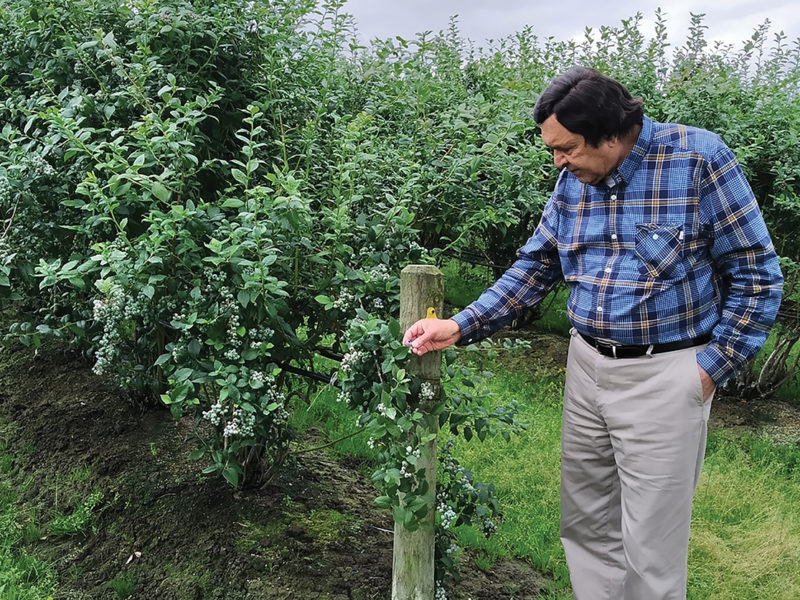by SARBMEET SINGH
ABBOTSFORD – BC blueberry growers face tighter profit margins this year due to COVID-19.
Public health protocols have created additional costs including the need for personal protective equipment for workers’ safety and a hike in labour costs. Meanwhile, fewer workers in the fields mean fruit could over-ripen, reducing quality and prices.
“We have spent more than $50,000 on the equipment including gloves, masks and hand sanitizer. Additionally, to maintain social distancing during lunch times, we have placed new tents for the workers,” says Rajinder Singh Lally, owner of Lally Farms in Abbotsford, pointing towards the new Plexiglas dividers being installed at his packing house to ensure social distancing between workers.
Lally owns 13 farms totalling 500 acres. Despite his size, he feels the extra costs are likely to reduce his profit margins.
Besides spending money on personal protective equipment – a significant cost in itself – farms are having to hire additional workers to sanitize everything from crates to retail areas.
Kris Maan at Maan Country Farms is also feeling the pinch due to the need for additional staff to maintain a high level of sanitation at the popular agri-tourism venue.
“We have hired workers just for sanitization,” he says. “They keep on sanitizing various things at the farm. We are very cautious about the disease. This has increased our costs.”
Farmers also fear over-ripening of fruit that can’t be harvested as quickly because of the need to maintain social distancing among workers. Picking began this year in early July and will last into September. The farm labour contractors who provide workers need to make more trips to deliver the same number of workers to farms, and there are also specific protocols at the farms themselves.
“We are planning to enroll the workers in picking berries by keeping them at a distance of at least one row. This will, however, cause over-ripening due to slow picking leading to a decline in price,” says Bhupinder Singh, a Punjabi farmer in Langley.
“We need around 200 people to pick berries in our farm,” says Parmjeet Sahota, who farms in Pitt Meadows. “This year we are not getting enough labour and that can result in over-ripening of the fruit because the berries can’t wait to be picked.”
The need to maintain space among workers is compounding troubles associated with a shortage of labour. To tackle the situation, farm owners are offering higher wages for pickers.
“In the past, we used to offer 50 to 60 cents per pound for picking berries for early and mid-season varieties, respectively. This year, we are planning to hike that by up to 10 cents per pound,” says Lally.
On an average, one person can pick around 300 pounds of berries per day, which means Lally will pay around $30 more per day to each worker. As hundreds of workers work at the farm, this will result in hundreds of extra dollars in harvest costs, and a reduction in profit margins. With an average yield of 12,000 pounds an acre, the extra pay could boost costs by up to $1,200 an acre.
Farm owners say many people are reluctant to work due to the Canadian Emergency Response Benefit, which Ottawa has announced will run an additional eight weeks until August 29. CERB pays $500 a week to workers who have lost work due to COVID-19, or about $2,000 a month. Recipients can accept work, but wages are capped at $1,000 before the benefit starts being clawed back. This means farmers would have to pay a full-time worker at least $3,000 a month in order for employment to be competitive with staying at home.
“The aid given by the federal government is also luring the people to not resume work. Monthly aid by the government is another factor contributing to the prevailing shortage of labour,” says Balraj Singh of Abbotsford. “When people can get money by sitting idle at their homes, why will they come to farms?”
But there’s also another reason for the shortage of workers that’s unique to Indo-Canadian farms.
A large number of Indo-Canadians rush to Punjab to visit their homeland in winter, a time when most of the marriages are held in Punjab. They return in April and May. However, due to COVID this year, many of them were not able to return on time as per their schedule.
“I went to India to attend (the) marriage ceremony of my relatives in December last year. I was scheduled to return by April end. However, due to COVID, all the flights were cancelled,” says Gurnam Singh, who worked on berry farms last year but has been unable to return to Canada for this season. “When the Canadian government started repatriating the Canadians, the costly flight tickets was another challenge before me. So, I decided to remain in Punjab for some more time and wait for the tickets to get cheaper.”
Pandemic puts the squeeze on blueberry growers
Reduced workforce threatens fruit quality


 Farm safety organization revamps
Farm safety organization revamps